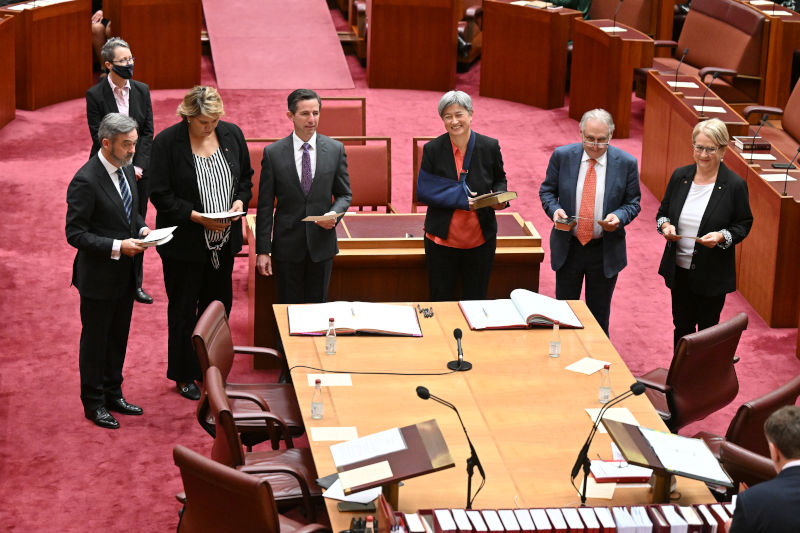Gary Highland: Changing the parliament and changing the country
August 4, 2022
_Kerrynne Liddle had to wait a nail biting 25 days to be confirmed as the final Aboriginal person elected to the Federal Parliament at the May 21 election.
_
An Arrernte woman, originally from Alice Springs, Senator Liddle was the sixth and first ever Aboriginal Senator elected from South Australia.
She joined ten other Aboriginal Members and Senators when the parliament resumed this week, the largest number in the history of the Federal Parliament. Despite the loss of outgoing Aboriginal Affairs Minister, Ken Wyatt in Hasluck, this representation crosses the political divide and includes Members and Senators from six different states and territories.
But what does this change mean for Australia’s 800,000 Aboriginal and Torres Strait Islander people? How will their lives be different under the new parliament and an Albanese Labor Government?
The most obvious starting point is the promise to implement the Uluru Statement from the Heart in full, including a referendum to constitutionally enshrine an Indigenous Voice to Parliament.
The Prime Minister acknowledged this above all other issues when he gave his victory speech on election night. Australia is now set to go to a referendum to enshrine the Voice as early as May next year.
But changing the constitution can’t be achieved by any government on its own. No referendum has ever succeeded in Australia without bi-partisan support.
Opposition Leader, Peter Dutton has acknowledged that he made a mistake in boycotting the 2008 Apology to the Stolen Generations. He says he could be open to supporting a Voice referendum if it can be demonstrated that this will achieve practical outcomes. The appointment prominent Voice supporter, Julian Leeser as Shadow Minister for Indigenous Affairs is a promising sign. Opposition support would maximise the chance of a successful referendum that is of great significance to Aboriginal and Torres Strait Islander people and poses no threat to anyone else.
But while the Voice was the Indigenous issue that received most prominence in the election campaign, it is far from the only priority for Aboriginal and Torres Strait Islander people.
One overlooked achievement of Scott Morrison as Prime Minister is the formal partnership he negotiated with Aboriginal leaders to jointly develop policy and programs to Close the Gap. Anthony Albanese has pledged to continue that partnership approach and increase investment. Close the Gap, which began as a campaign started by then Social Justice Commissioner, Tom Calma, was then adopted by Prime Minister Kevin Rudd and has been refined under successive governments is an example of the long term, bi-partisan commitment needed to secure change in this most difficult of policy areas.
While the partnership with Aboriginal leaders will continue in the area of health, things are less specific regarding cultural heritage protection. The previous government negotiated a partnership with the First Nations Heritage Protection Alliance to jointly develop options to reform Australia’s inadequate cultural heritage protection laws. Co design of this legislative reform was a recommendation of the parliamentary inquiry into the Juukan Gorge destruction. Labor has pledged new standalone First Nations heritage protection legislation and to “work with” the Alliance and other stakeholders to develop it. But “working with” does not necessarily mean an equal partnership.
Clarifying its position on cultural heritage reform is an urgent task for the new government as this issue is of concern to a majority of Australians.
The task for Labor will be to urgently put a stop to the ongoing destruction of cultural sites before a comparable disaster to Juukan Gorge occurs on its watch. But it must also provide certainty to the resources industry which has provided jobs and commercial opportunities to thousands of Aboriginal families.
More certain are the new government’s plans to tackle the over-representation of Aboriginal people in custody.
It has now been more than three decades since the Royal Commission into Aboriginal Deaths in Custody handed down its report. 500 Aboriginal people have since died in custody with many of its recommendations never implemented. Others are in need of review.
The new government will convene a national summit to drive coordinated action on deaths in custody. It also promises to expand Justice Reinvestment programs to 30 communities across the country, increase funding to Aboriginal Legal Services and restore funding to the National Family Violence Prevention Legal Services Forum.
Similar nationally coordinated efforts are needed in the areas of employment and housing.
The $100 million Labor has committed to remote housing in the NT is positive as is the $200 million for repairs across remote Australia.
However, Aboriginal families in regional and metropolitan areas also experience significant housing shortages and overcrowding. While this is largely a state responsibility, co-ordination by the new federal government would be very welcome.
Although progress is always too slow in Aboriginal and Torres Strait Islander affairs, the changed composition of the national parliament is significant. Only long-term, cross-party commitment will secure the changes needed to permanently close the gaps in living standards, opportunity and understanding between the First Australians and those of us who came after.
Gary Highland is a Director at C|T Group, where he heads the company’s Indigenous Affairs consultancy. He is a former Chief of \Staff at the NSW Aboriginal Land Council and National Director of ANTaR.

